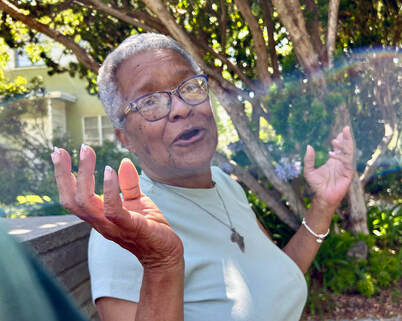By P.J.C.
Francine Riley was born in Tennessee, where her father was stationed in the service, but moved to San Diego as a little girl with her parents. She lived in the Linda Vista neighborhood, not far from Old Town and Mission Bay, and close to the downtown airport that sends flights over large swaths of the city… one of her fondest childhood memories is eating ice cream cones and sitting near the edge of the runway while the huge planes roared overhead, rumbling to touch down to the landing strip.
Francine is part Choctaw and it’s something you can see in the features of her face, which is strong and powerful with high cheekbones, her expressions full of bright energy.
Francine is part Choctaw and it’s something you can see in the features of her face, which is strong and powerful with high cheekbones, her expressions full of bright energy.
Francine has lived here at the Village for about five years, after a long career as a legal secretary for the global law firm Latham and Watkins, where she was so invaluable that her superiors tried to recruit her to work for a time in Baghdad, Iraq, on a project with the firm (she declined). Not surprisingly, with this sort of profession, she was a master of the English language, an avid reader.
In 2020 she suffered a stroke in her Court 4 home and was briefly hospitalized. The stroke left her with a neurological condition called aphasia, in which the pathways from her brain’s speech centers are impaired. As a result she can struggle with certain words and parts of speech. She will, for example, want to describe the day when she fell ill. She’ll want to name the service that took her to the hospital, but instead of saying ‘fire truck’ out of her mouth will come ‘fireworks.’ This is the sort of struggle that can be especially frustrating and poignant for someone who has prided herself on her exceptional language skills for much of her life.
I run into Francine and her little white dog, Goldie, on walks with my own dogs, Louie and Josie; in the three months we’ve been talking she’s battled back such that her abilities are improving immensely. If you see her around Court 4 with Goldie, please say hello and have a patient chat. Despite her impairments, she’s one of the sharpest tacks I’ve found here among my neighbors.
In 2020 she suffered a stroke in her Court 4 home and was briefly hospitalized. The stroke left her with a neurological condition called aphasia, in which the pathways from her brain’s speech centers are impaired. As a result she can struggle with certain words and parts of speech. She will, for example, want to describe the day when she fell ill. She’ll want to name the service that took her to the hospital, but instead of saying ‘fire truck’ out of her mouth will come ‘fireworks.’ This is the sort of struggle that can be especially frustrating and poignant for someone who has prided herself on her exceptional language skills for much of her life.
I run into Francine and her little white dog, Goldie, on walks with my own dogs, Louie and Josie; in the three months we’ve been talking she’s battled back such that her abilities are improving immensely. If you see her around Court 4 with Goldie, please say hello and have a patient chat. Despite her impairments, she’s one of the sharpest tacks I’ve found here among my neighbors.


 RSS Feed
RSS Feed